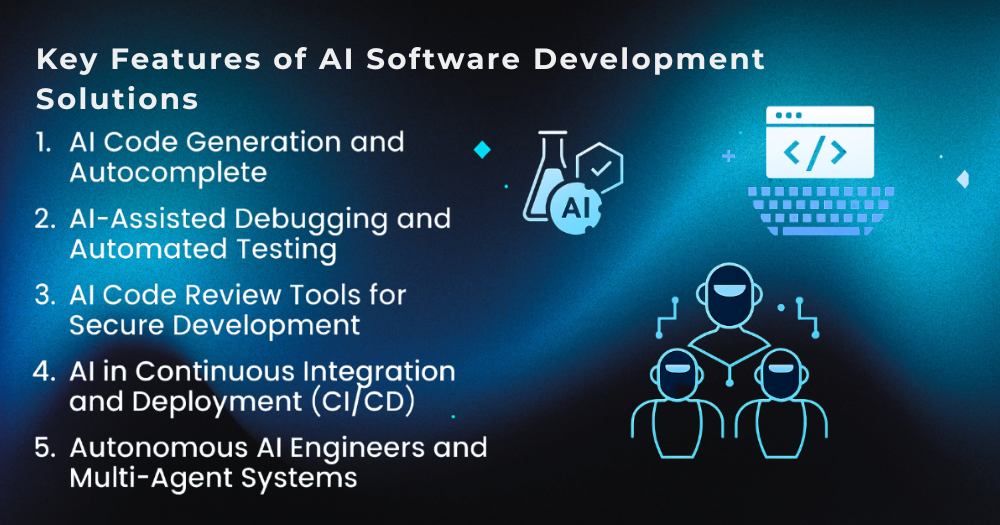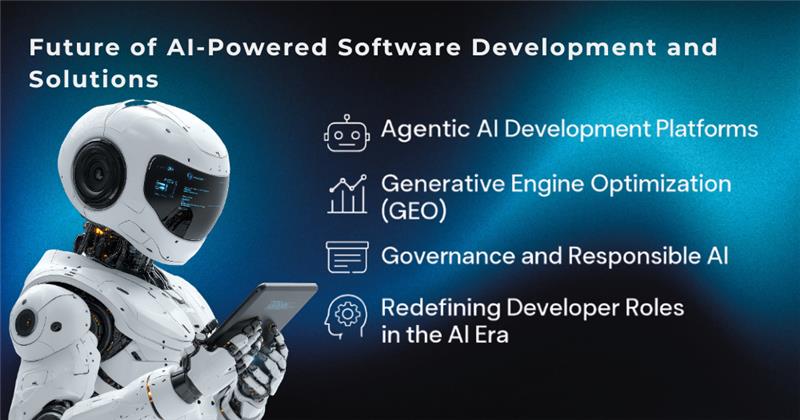AI-Powered Software Development and Solutions: Complete Guide 2025
AI-powered software development is the practice of integrating artificial intelligence technologies such as machine learning (ML), deep learning, and natural language processing (NLP) into the software engineering lifecycle. These solutions automate repetitive coding tasks, provide intelligent recommendations, and accelerate testing, deployment, and maintenance.
By 2025, more than 60% of software developers globally are using AI-powered development tools, marking a major shift in how applications are created and maintained.
The evolution of AI in software development can be divided into distinct phases:
- 1980s–1990s: Early expert systems and rule-based programming tools.
- 2000s: Predictive analytics introduced machine learning into debugging and testing.
- 2017–2020: AI code completion tools integrated into IDEs.
- 2021–2023: Rise of AI-assisted software development tools such as GitHub Copilot and Tabnine.
- 2024 onwards: Introduction of agentic AI development platforms like Devin AI and AutoDev capable of autonomous coding, debugging, and deployment.

1. AI Code Generation and Autocomplete
AI code generation tools allow developers to convert natural language instructions into working code. This feature improves productivity by minimizing manual coding and accelerating prototyping.
2. AI-Assisted Debugging and Automated Testing
AI-powered debugging tools detect vulnerabilities and generate unit, integration, and regression test cases automatically, improving the efficiency of software testing automation.
3. AI Code Review Tools for Secure Development
Platforms like Snyk and Qodo.ai provide AI-driven code reviews, detecting performance bottlenecks and security flaws in real-time. These tools enhance secure AI-powered development practices.
4. AI in Continuous Integration and Deployment (CI/CD)
AI integration into CI/CD pipelines predicts build failures, automates rollbacks, and optimizes deployment schedules, ensuring software stability and reliability.
5. Autonomous AI Engineers and Multi-Agent Systems
New platforms such as Devin AI and AutoDev represent autonomous AI engineers. They can independently plan software architecture, write code, run tests, and deploy applications.
- Enhanced Developer Productivity – AI-assisted tools increase output and reduce manual workload.
- Faster Time-to-Market – Automation accelerates testing and deployment cycles.
- Improved Code Quality – AI-driven bug detection reduces post-release issues.
- Lower Development Costs – Automation reduces the need for repetitive manual tasks.
- Democratization of Coding (Vibe Coding Trend) – The vibe coding trend allows non-technical users to build applications using natural language prompts.
- Security and Ethical Concerns – AI-generated code can introduce vulnerabilities if not reviewed.
- Overreliance on AI in Development – Excessive automation may reduce developer problem-solving skills.
- Quality vs. Speed Trap – The push for faster delivery may compromise long-term stability.
- Intellectual Property Issues – Ownership and copyright of AI-generated code remain unclear.
1. Enterprise Application Development
Businesses use AI-powered enterprise solutions to streamline complex applications with automated documentation, predictive analytics, and real-time optimization.
2. Mobile App Development with AI
AI in mobile app development assists with cross-platform frameworks, UI/UX personalization, and app performance optimization.
3. Web Development Using AI Tools
AI simplifies web development by supporting frontend design automation, backend optimization, and real-time error detection.
4. AI in Cloud-Based Software Engineering
AI enhances cloud-native development by predicting workload requirements, managing distributed systems, and automating error handling.
6. AI in DevOps and Agile Development
In DevOps, AI enables intelligent monitoring, CI/CD automation, and predictive deployment management. In Agile, AI helps prioritize sprints and allocate resources efficiently.
- Human-AI Collaboration – Developers should validate AI-generated code with manual expertise.
- Security-First Approach – Adopt AI code review tools to ensure compliance with global security standards.
- Balance Speed with Stability – Avoid shortcuts that may affect long-term software reliability.
- Training and Upskilling Developers – Teams must learn how to leverage AI-assisted development tools effectively.
- Governance and Compliance – Organizations should establish ethical policies for AI adoption in software development.

1. Agentic AI Development Platforms
Future platforms will feature agentic AI systems capable of independently managing entire development lifecycles.
2. Generative Engine Optimization (GEO)
Generative Engine Optimization (GEO) focuses on structuring code and documentation for AI-based search and retrieval, redefining modern SEO practices.
3. Governance and Responsible AI
Organizations are adopting stricter frameworks for ethical AI in software development, ensuring transparency, accountability, and bias reduction.
4. Redefining Developer Roles in the AI Era
The role of developers is evolving from code writers to builders and system architects, as AI agents handle execution-level coding tasks.
AI-powered software development and solutions represent a paradigm shift in the global software industry. From AI code generation and automated testing to agentic AI platforms, these tools significantly improve speed, security, and scalability.
While challenges exist in terms of ethics, security, and intellectual property, the future promises a collaborative model where human developers focus on creativity and architecture, while AI handles execution, testing, and optimization.
In essence, the future of software engineering will be defined by the synergy of human intelligence and artificial intelligence, driving innovation in every sector of technology.


.jpg)
.jpg)

No comments:
Post a Comment